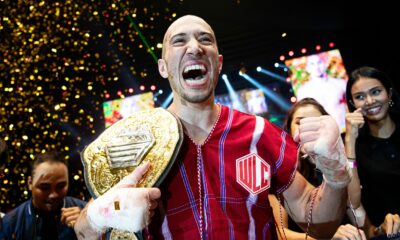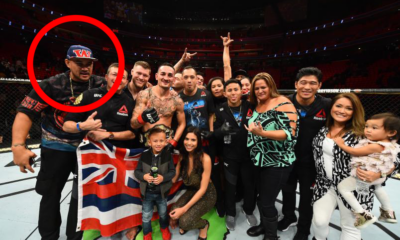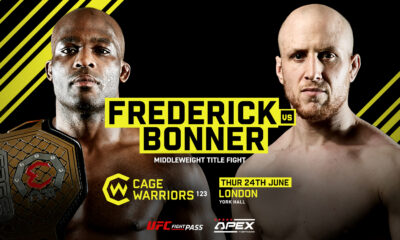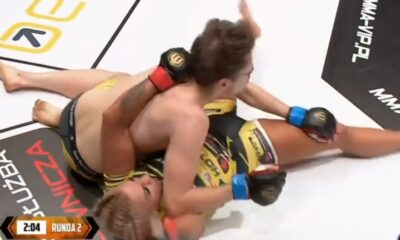

Opinion
Why do MMA fans hate interim champions?
Since the inception of the UFC in 1993, there has been a total of 21 interim champions. This ranges from Randy Couture at UFC 43 to Petr Yan at UFC 267. For such a common occurrence, interim championships are generally frowned upon by fans. But, why is this?
Before we delve deeper, first, we have to understand all there is to know about interim titles.
What is an interim title?
An interim title is a version of the belt that is fought for by two contenders or an existing champion. If someone in a division has an interim title, the champion of the division loses their “undisputed” status. This is because there now two belt-holders in the division

What’s the point of an interim title?
If the champion of a division is injured, inactive or cannot fight for any reason, the promotion may decide to create an interim title. This means that the person who wins the interim title – the interim champion – is treated as a champion until the champion can return. Sometimes, this includes defending their interim belt.
When the champion does return, they will most likely fight the interim champion in a title unification match. The winner of the fight will be known as the undisputed champion. Should the champion not return, the interim champion is usually promoted to official/undisputed champion.

Who can fight for an interim title?
Generally, two top contenders are chosen to be interim title challengers. If the champion is scheduled to fight but has to withdraw, the challenger may take on another opponent for an interim title. If the promotion is aware that the champion may is inactive or cannot fight, an interim championship fight can be booked in advance, with two top contenders.

With all this in mind, we need to ask ourselves – why are interim champions hated so much?
There are plenty of different answers that you will hear from fans. Here are some of the most common answers, with explainations and some examples to go along with them.
“There can’t be two champions in a division”
A recurring sentiment amongst fans is that having two titlists in a division is a bad idea. The entire concept of interim championships are frowned upon by these fans. They often feel that the interim champion’s claim to a title is illegitimate. The term “glorified number-one contender” is brought up a lot when talking about interim champions. Though I could name plenty of examples, this point is brought up with almost every single interim title fight.

“There are too many interim champions”
This criticism tends to be directed moreso at the UFC than the concept of interim titles. These fans feel like interim championships should only be introduced when absolutely necessary. When interim titles are constantly on the line, the value of titles drop, they usually believe. In 2016, the UFC saw three interim title fights, which faced backlash from fans.

“Unworthy challengers fight for belts”
Though the idea is to have top contenders fight for an interim title, there has been times where the UFC has put questionable competition into these fights. A famous example of this was the 2016 fight between Jon Jones and Ovince Saint Preux.
After champion Daniel Cormier was forced out of his UFC 197 bout with Jones, the UFC searched for a replacement. The promotion ultimately went with #6th ranked Saint Preux, who was 1-1 in his last two. The overmatched Saint Preux lost a lopsided decision in a lackluster bout. The fight raised doubts over whether or not someone of his caliber should be fighting for titles.

“They’re used to make money”
One major accusation the UFC gets from fans is that interim titles are merely a money-making strategy. The general idea around this is that the promotion attaches interim titles to fights to try buzz up interest among fans. This complaint is usually coupled with the argument that the UFC has a tendency to turn a bout into an interim title fight on short notice if the original main event falls out.
When UFC 206’s original main event was cancelled, the UFC decided to boost Max Holloway vs Anthony Pettis to the marque spot. Instead of the bout proceeding as it was originally booked, an interim title was added on. Jose Aldo, who was already interim champion at 145lbs, was promoted to official champion. That meant that Conor McGregor, who was official champion, was stripped of his title.
This caused massive outrage at the time, as it seemed the only reason for the decision was to have a title fight in the main event of UFC 206.

Despite the general atmosphere around interim titles in MMA being negative, this isn’t the case for all of them. At UFC 267, Petr Yan won the interim bantamweight championship, and is seen as a ‘true champion’ by a large amount of fans.

Another interim bantamweight champion who received a lot of support is Renan Barao. During his reign as an interim titleholder, he defended the belt twice, making him the only person in UFC history to do so.

***
What are your thoughts on interim champions? Do you agree with the complaints about them? Let us know in the comment section below!
News
The Return of Sam “The Future” Patterson

Watford UFC prospect and DWCS winner Sam “The Future” Patterson is set to make a return. He is set to take on Canadian fighter Yohan “White Lion” Lainesse in a welterweight bout on January 20th at UFC 297.
Both fighters picked up victories in their DWCS appearances, but have since lost a UFC bout. It is essential that both men now give everything they can to win this fight and ensure there career in the UFC continues. Whilst both Patterson (10-2-1) and Lainesse (9-2) are well rounded fighters, Patterson has picked up 50% of his wins by submissions and Lainesse has yet to claim a tapout victory. The Englishman currently a brown belt in BJJ under David Lee who holds a 3rd degree black belt through (Ze Marcello – icon jiu jitsu). This is not to say his striking is any less dangerous, with four of his wins also being from KO/TKO.
On the other side of the cage, we have Canada’s Lainesse. His last bout ended in a submission loss, but he is well capable of finishing the fight in a flash. He holds five explosive first round knockouts on his record. This is not to say, of course, that Lainesse will struggle when it comes to grappling and ground control. He comes into the bout with a 80% takedown defence.
I expect this fight to be an explosive war between two fighters who will stop at nothing to ensure they get to add this win to their records in the UFC. This will be both fighters hardest fights, given that both have well-rounded arsenals. It would be a mistake to miss this fight, with such high stakes on the cards for both fighters. Patterson vs Lainesse has the potential to be one of the highlights of UFC 297.
***
For more UFC content, stay tuned to Violent Money TV.
News
Jake’s Takes – Francis Ngannou made himself a legend against Tyson Fury

I was excited for Tyson Fury vs Francis Ngannou. It wasn’t because I thought it would be a thrilling contest; if anything, I expected it to be a ten-round dud, filled with wild shots from Ngannou and Fury trying to coast his way into a payday with Oleksandr Usyk. No, I was excited for the fight because it was Ngannou’s opportunity to make an eight-figure sum and introduce himself to a wider combat sports audience.
The rhetoric that I engaged with on fight week revolved around the same key premise: if Ngannou can go ten full rounds with the WBC heavyweight champion and walk out with cash in hand, he will have the moral win. I agreed with it. In fact, I felt that Ngannou had won long before this fight ever happened. My curiosity for the fight was purely driven by seeing the former UFC champion make the money he had fought for.
By the end of the night, however, that curiosity had shifted to a completely different stratosphere. Why? Because Francis Ngannou put on the performance of a lifetime against Tyson Fury.

Everybody knew that Ngannou had the one-hitter-quitter power to give Fury some trouble, should he connect flush. The odds of that happening weren’t very likely though. Fury was a defensive wiz that made other heavyweights look slow and foolish. Ngannou said, “fuck the odds,” and put him down anyways.
Not only did he score a knockdown against Fury in round three, he continued to outbox Fury for the better part of ten rounds. His handfighting prevented Fury from getting an effective jab going. His shots from the southpaw stance left Fury without an answer. Fury’s usual strategy of using his size to weigh on the opponent in the clinch had no effect. I couldn’t believe what I was watching.
At the end of ten rounds, my scorecards read 95-94 to Ngannou. Not a thorough domination, but a competitive fight between a debutant and a world champion. One judge agreed with my interpretation of the bout, but two others had it 96-93 and 95-94, respectively, to Fury. The official result didn’t matter much though; Ngannou made a statement beyond what anybody thought he was capable of. The community’s consensus was that he had won the fight and the only reason Fury had emerged victorious was to protect the undisputed title fight between he and Usyk, which had been tentatively slated for December.
In a sport as corrupt as boxing, I really wouldn’t be surprised if this was the only reason. Still, as I said, it really doesn’t matter. The world knows that Francis Ngannou won in every sense of the word.

It’s hard to even put the magnitude of his accomplishment into perspective. Ngannou, a 37 year old mixed martial artist with no boxing experience, coming off a near two-year layoff from a knee injury, gave the lineal heavyweight champion the toughest fight of his career. He had given up his status as UFC champion because he hedged his bets on the belief that he could prove his right to the claim of ‘baddest man on the planet’ in the squared circle. It sounds ludicrous – and it is – and the vast majority of support that he was getting was because people were happy to see him earn a major payday. Very few, if any, thought Ngannou was going to have any realistic chance against Fury.
Don’t expect Ngannou to ride off into the sunset. He feels that his boxing journey has only just begun. Fans are clamouring to see him stay in the ring. He won’t have a tough time trying to convince promoters to book him either; WBC president Mauricio Sulaiman, in an incredibly rare moment of competence, confirmed to Dewey Cooper that Ngannou will be ranked in the body’s top ten. This could open him up to any number of matchups, chiefly a title rematch with Fury or an epic encounter with former champion Deontay Wilder.

We shouldn’t forget about his lucrative PFL deal either. Should he go back to MMA, he’ll have another multi-million purse waiting for him, along with executive duties within the company. His newfound superstar status will only elevate the stock of the promotion.
What Ngannou did on Saturday night was nothing short of legendary. He earned his millions, announced himself to the world of boxing and still has plenty of prospects on the horizon. Comhghairdeachas leat, Francis.
***
For more combat sports content, stay tuned to Violent Money TV.
News
MMA Has A Homophobia Problem

I have been planning on an in-depth look at homophobia within MMA for about three years now. My friend brought it up as a possible topic to write about to kickstart my freelance career. Being a member of the LGBTQ+ community, it was something that appealed to me on a personal level. I gave a measly attempt at an opening paragraph before deciding that I needed some more time to think about the topic.
It got something of a revival earlier this year. Hearing the news about Jeff Molina being outed and the ensuing social media chaos made me realise that this problem hadn’t gone anywhere (not that I had assumed it had disappeared). I went back to my original draft and gave it a much better go this time. It was unfinished, but it was something that I fully intended on finishing and publishing. I was thinking about reaching out for interviews and the like; a Panorama level of investigation, in my mind. Once again, however, it ended up being swept into the corner of my working mind.
Then, UFC 293 happened.
Two fighters – Charles Radtke and Manel Kape – used homophobic slurs in their post-fight interviews. The situation immediately picked up wind on social media. To be the two most controversial men on a card headlined by Israel Adesanya and Sean Strickland was an impressive feat. I knew that I had to put something out on it, even if it wasn’t the article that I had originally intended it to be. This is what I’m doing now.

Already, I know that publishing this piece will open me up to being berated and harassed. It might mean that I lose out on opportunities with some fighters, but I don’t care. I feel like I need to say my bit, as somebody who is a both a member of the MMA media and openly bisexual. It’s a duty that’s written into the gay contract that we sign at birth.
Hearing two fighters on the biggest stage in the world using that language in this day and age is disappointing, for sure, but it wasn’t overly surprising. It isn’t the first time that Kape has used that word in reference to an opponent. That wasn’t my main takeaway. It was more so about the fans and their reactions.
I saw people lauding both Radtke and Kape for being unafraid to use that word. They saw it as a win for their side of the ‘culture war.’ Why you would support someone for using a term that is pejorative and hurtful to many people, I personally don’t know. Those same people turned on Radtke and Kape when they inevitably apologised.
Dana White didn’t have too much to say at the post-fight press conference. “I think these guys get a little excited, and you make bad mistakes,” he said. “You know me; we didn’t run over to him and say ‘you better apologise’ – [Kape] did that on his own when he got backstage […] We make mistakes. I am not holier than thou either. We’ve all been in positions where we’ve made mistakes, and like I always say, it’s how you recover from it and how you carry yourself after.”
Don’t be mistaken: I’m not all that offended by the word in question. I’ve heard it plenty of times, I’ve had it used against me plenty of times. My issue lies with the how the fanbase has reacted to the situation and how the promotion is handling it.

People attacked Jeff Molina when videos of him were maliciously posted. Even before his sexuality was outed, Muhammad Mokaev called him a freak for wearing shorts with rainbow lettering. He wasn’t the only one to jump on that either. People don’t bat an eye when the likes of Paulo Costa use homophobic or transphobic slurs; if they do, it’s nothing but laughter. Rafael dos Anjos got support from fans after a homophobic tirade on Twitter. Amanda Nunes faces hate for raising her children with her wife.
Like I mentioned, people applauded Radtke and Kape and then shunned them when they apologised. Nobody on the broadcast team mentioned the situation that occurred over the weekend. All of these things are tell tale signs of a serious issue that so many fans do not want to address. MMA has a homophobia problem.
A culture of homophobia within the sport is only going to discourage people from joining the community. No matter where your politics may fall, I don’t know how showing a basic amount of respect to LGBTQ+ folks is out of bounds for you. It involves not using slurs like the one used at UFC 293. It involves being accepting of people, no matter where their sexual orientation lies. Refusing such basic propositions is only going to freeze this sport in time.
In terms of the UFC itself, I really doubt that we’ll see any consequences for Radtke and Kape. Even if they hadn’t have apologised, their positions as fighters in the world’s biggest promotion would’ve been secure.
Dana says himself that he isn’t the kind of person to punish fighters for speaking their mind. No one was asking for that, though. They were asking for appropriate measures, whatever they may be, to be carried out against two athletes who openly and maliciously used a hateful slur during a broadcast. That’s the standard in the vast majority of other major sports.
Many years ago, they fined Nate Diaz thousands of dollars for his use of the word in a tweet. You’d be laughed at for suggesting that something like that happens these days. The UFC has shifted further and further into a societal and political position where holding people accountable for their actions isn’t a priority.
The excuse of “this is the fight game” was used when Oron Kahlon called Afghan Javid Basharat a terrorist at the weigh-ins for their fight on the Contender Series. I mean, ten points for observation, but that doesn’t mean that you’re allowed to say blatantly prejudiced things.

It’s not all bad though. There are plenty of fighters, media members and fans that are allies and that call this type of behaviour out when it occurs. I was delighted to see that Ian O’Neill of Severe MMA was speaking to Amanda Nunes, the UFC’s first openly gay champion, about fighting during Pride Month. It’s refreshing to see, but only because everything else is a cesspit of backward hatred.
I’d like to offer a solution, but I don’t know if there is any. The MMA community seems to breed hate more than any other that I’m a part of. As it pertains to the UFC, I would suggest implementing standard practices for when an athlete behaves like this. In the NBA, for example, a player was fined $40,000 for his use of homophobic words. Whatever the disciplinary actions are, they should be universal across all major sporting leagues. There’s little to no chance that this will ever reach the UFC in modern times, however.
Instead, all I can do is encourage LGBTQ+ people within the sport to keep their heads held high.
I still intend on a long-form piece that tackles this topic on a deeper level. When it’ll be ready, I have no idea. One thing I won’t have to worry about, however, is looking for evidence to back up my claims.
***
For more MMA content, stay tuned to Violent Money TV.
-

 News3 years ago
News3 years agoKing of Lethwei Dave Leduc BANNED from Myanmar and competing in the sport
-

 News3 years ago
News3 years agoSam Kapoi, half-brother of Max Holloway, sentenced for meth possession
-

 News3 years ago
News3 years agoNathias Frederick vs Matthew Bonner revealed for Cage Warriors 123
-

 News3 years ago
News3 years agoUAE Warriors 19 & 20 fight cards
-

 News3 years ago
News3 years agoPaige VanZant is seeking a KO victory over Rachael Ostovich
-

 News3 years ago
News3 years agoThe Latinas of Combate Global set for world domination
-

 News2 years ago
News2 years agoFans disgusted at inter-gender MMA fight in Poland
-
Interviews2 years ago
VMTV Vaults | EP.38 – Deniz Ilbay











